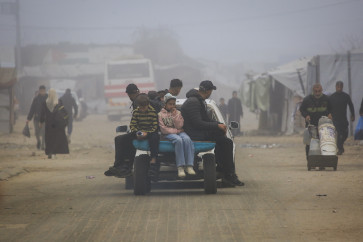Popular Reads
Top Results
Can't find what you're looking for?
View all search resultsPopular Reads
Top Results
Can't find what you're looking for?
View all search resultsDomestic market a lifeline for nation: SBY
President Susilo Bambang Yudhoyono demonstrated his academic prowess Tuesday while addressing an economic forum about the ways Indonesia could withstand the ongoing global financial crisis
Change text size
Gift Premium Articles
to Anyone
President Susilo Bambang Yudhoyono demonstrated his academic prowess Tuesday while addressing an economic forum about the ways Indonesia could withstand the ongoing global financial crisis.
Speaking at the 46th anniversary of Brawijaya University, Yudhoyono asked the nation to learn from its Asian neighbors who strengthened domestic markets, rather than rely on exports, to survive the global crisis.
Yudhoyono, who completed a doctorate degree in agricultural economics from the Bogor Institute of Agriculture in 2004, said export-oriented countries were vulnerable to the crisis in overseas markets.
The President said Indonesia had enough capital, both in terms of labor force and natural resources, to develop the domestic market to its full potential, particularly with a population of 230 million people.
"Like South Korea, Taiwan and Singapore, we shall not depend on exports. If we're export oriented, once foreign markets are hit by the crisis and reject our products we will be easily affected. Our economy will be disrupted and mass layoffs will occur," Yudhoyono said.
The President asked regional administrations to develop their resources to empower the domestic economy and challenged academics attending the forum to invent knowledge-based approaches to develop a "sustainable and environmentally-friendly" economy for Indonesia.
He insisted the country would maintain its "social-justice open economy" and would continue to combine market mechanisms and government intervention to balance the economy.
"We do need some market regulations, but we don't agree with pure capitalism," he said.
Yudhoyono said the current global economic crisis, the Asian financial debacle in late 1990s and the Great Depression in 1930s had been sparked by "imbalances" in the world's economy, the result of the so-called bubble economy phenomenon.
The imbalances, he said, pit strong developed nations against poor weak nations, supply against demand and production against consumption.
Yudhoyono highlighted how the uneven distribution of natural resources, disparity in financial capitals and advances in technology had affected the incomes of many countries. The world, he said, was divided between developed nations, which own multinational companies, and poorer, developing nations.
He also blamed "outrageous" market speculation for the ongoing global economic downturn, a condition he said occurred after the burst of the economic bubble.
"These factors have made the global economy unstable, unsafe and unpredictable. We must take serious action to fix these imbalances," Yudhoyono said.
Later that day, the President visited the Islamic State University to rename it after one of the earliest Islamic teachers in Java, Maulana Malik Ibrahim, better known as Sunan Gresik.
The announcement was unveiled during the inauguration of a new building at the university.
"This new title is expected to inspire young Muslim intellectuals to learn from the struggle of Maulana Malik Ibrahim," Yudhoyono said.
The President said Maulana had taught Muslims in Indonesia about promoting Islam through peaceful, civilized and cultural approaches.
Yudhoyono said leaders in the Islamic world hoped Indonesia, as the country with the largest Muslim population in the world, would contribute to global peace, justice and prosperity.










